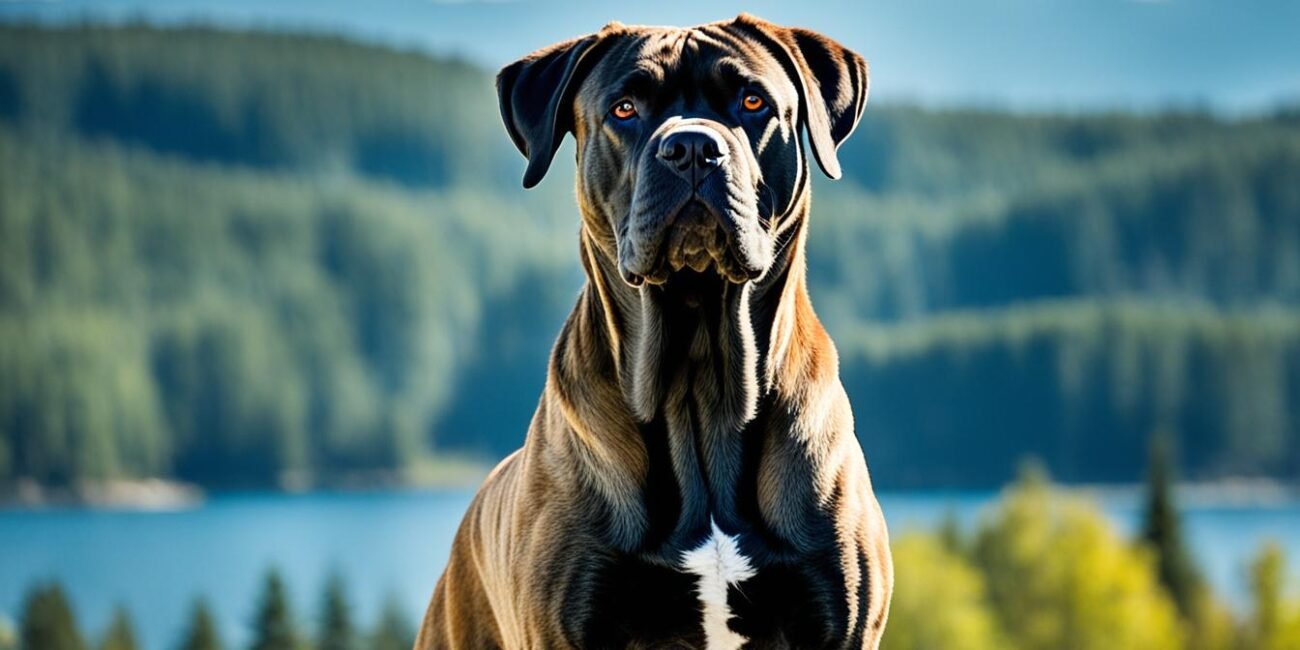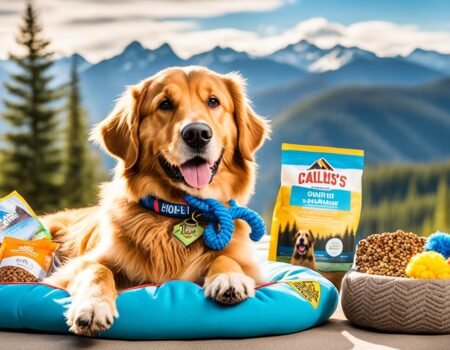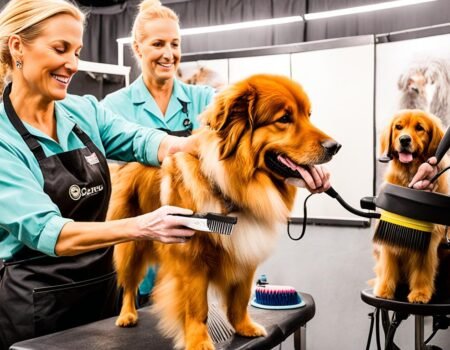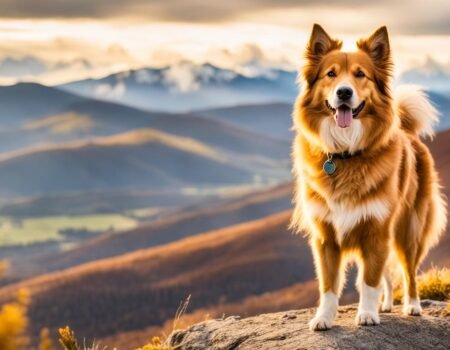Did you know that mixed breed dogs, also known as canine crossbreeds, are becoming increasingly popular among pet lovers? One such designer dog that has caught the attention of many is the Cane Corso Lab mix. This unique hybrid breed combines the qualities of the loyal and energetic Cane Corso with the friendly and versatile Labrador Retriever. In this guide, we will delve into the traits, characteristics, and considerations of welcoming a Cane Corso Lab mix into your home.
Key Takeaways:
- The Cane Corso Lab mix is a popular hybrid breed, combining the traits of the Cane Corso and Labrador Retriever.
- Mixed breed dogs, or canine crossbreeds, are gaining popularity among pet lovers.
- The Cane Corso Lab mix offers a unique blend of loyalty, energy, and versatility.
- Understanding the characteristics and needs of both parent breeds is important before adopting a Cane Corso Lab mix.
- Active families who can provide ample exercise and mental stimulation are well-suited for this hybrid breed.
Breed Overview
The Cane Corso Lab mix is a popular hybrid breed that combines the qualities of the Cane Corso and Labrador Retriever. This mixed breed is known for its unique blend of traits and makes an excellent companion for active families. Let’s take a closer look at the characteristics and considerations of the Cane Corso Lab mix.
Weight, Height, and Lifespan
The Cane Corso Lab mix is a large dog breed that typically weighs between 70-90 pounds and stands at a height of 22-25 inches.
They have a lifespan of 11-13 years, providing years of love and companionship to their owners.
Colors
The Cane Corso Lab mix comes in a variety of colors such as black, chocolate, and brindle. These beautiful coat colors add to the unique appearance of this mixed breed.
Child and Canine Friendliness
When it comes to child friendliness, the Cane Corso Lab mix is known to be good with children, making them a suitable choice for families. However, it is important to ensure proper socialization and supervision to ensure a harmonious relationship between the dog and children.
Additionally, the Cane Corso Lab mix is generally friendly towards other canines, making them a great choice for families with multiple pets.
Training Difficulty and Grooming Upkeep
The Cane Corso Lab mix may have a moderate to high training difficulty, as it can inherit traits from both parent breeds. Consistent training and positive reinforcement techniques are recommended to ensure a well-behaved and obedient dog.
When it comes to grooming, this mixed breed generally has a short, low-maintenance coat. Regular brushing and occasional baths are usually sufficient to keep their coat clean and healthy.
Breed Health and Exercise Needs
Like any other dog breed, the Cane Corso Lab mix may be prone to certain health issues. It is important to be aware of potential breed-specific health concerns and schedule regular check-ups with a veterinarian.
The Cane Corso Lab mix has moderate to high exercise needs. Daily physical activity, such as walks, runs, and playtime, is essential to keep them mentally and physically stimulated.
Puppy Costs and Parent Breeds
When considering a Cane Corso Lab mix, it is important to take into account the costs associated with owning a puppy. This includes initial expenses such as adoption fees, vaccinations, and spaying/neutering, as well as ongoing costs like food, grooming, and veterinary care.
The Cane Corso Lab mix is a crossbreed between the Cane Corso and Labrador Retriever. Each parent breed brings its own unique characteristics to the mix, creating a one-of-a-kind companion.
| Aspect | Cane Corso Lab Mix | Labrador Retriever |
|---|---|---|
| Weight | 70-90 pounds | 55-80 pounds |
| Height | 22-25 inches | 21 ½ to 24 ½ inches |
| Lifespan | 11-13 years | 10-12 years |
| Colors | Black, Chocolate, Brindle | Variety of Colors |
| Child Friendliness | Good | Excellent |
| Canine Friendliness | Good | Good |
| Training Difficulty | Moderate to High | Easy to Train |
| Grooming Upkeep | Low | Low to Moderate |
| Breed Health | Potential Health Concerns | Potential Health Concerns |
| Exercise Needs | Moderate to High | High |
| Puppy Costs | Varies | Varies |
Cane Corso
The Cane Corso, also known as the Italian Mastiff, is a powerful and majestic dog breed that has captured the hearts of many. With their imposing appearance and impressive size, it’s no wonder that they have gained popularity as both a working dog and a beloved family companion.
Originating from Italy, the Cane Corso was primarily bred to work on farms in the Italian countryside. They were tasked with protecting livestock and property from predators and intruders. Their strong and muscular build, coupled with their natural instincts, made them excellent boar hunters and guardian dogs.
The Cane Corso is a large breed, typically weighing between 88 and 110 pounds and standing at a height of 23 to 27 inches. Their robust physique is complemented by their elegant and imposing presence.
While their size and protective nature might seem intimidating, Cane Corsos are known for their loyal and affectionate temperament. They are devoted to their families and are renowned for their gentle and loving demeanor.
Often compared to Pitbulls, Cane Corsos share similar guardian instincts and a natural instinct to protect their loved ones. However, it’s important to note that their temperament can vary depending on their upbringing and socialization.
Nowadays, the Cane Corso has gained popularity not only for their working abilities but also as adored family pets. Their intelligence, loyalty, and affectionate nature make them a favorite among dog enthusiasts.
If you’re considering adding a Cane Corso to your family, it’s essential to understand their unique characteristics and properly socialize and train them for a harmonious coexistence. With the right care and environment, they can become a loving and devoted companion for many years to come.
Labrador Retriever
The Labrador Retriever is a family favorite known for its energetic and friendly nature. This versatile breed has been consistently ranked as the number one dog by the American Kennel Club for nearly three decades. Labradors are highly energetic and thrive on physical activity, making them excellent companions for active individuals and families. They have a natural affinity for water and are exceptional swimmers. Whether it’s retrieving a ball or taking a dip in the pool, Labradors have a true love for swimming.
Labradors are not only energetic but also obedient and friendly. They are known for their good-natured temperament and make excellent family pets. Their friendly and gentle nature extends to people of all ages, including children. Labradors are highly trainable and eager to please, which makes them obedient and responsive to commands. Their intelligence and versatility also make them well-suited for various roles, such as service dogs, search and rescue dogs, and therapy dogs.
When it comes to size and weight, Labradors are considered medium to large dogs. Adult Labradors typically weigh between 55 and 80 pounds, with males being slightly heavier than females. They stand between 21 ½ to 24 ½ inches tall at the shoulder. These dimensions, combined with their sturdy build and athletic physique, contribute to their prowess as active and agile dogs.
Labrador Corso Temperament
The temperament of a Labrador Corso can vary, depending on which parent they take after more. Generally, they are sociable and friendly dogs, but may be slightly more suspicious of strangers compared to Labradors. They are excellent watchdogs and are protective of their family. Labrador Corsos are known to be energetic and playful, bringing joy and laughter to their loved ones. They are loving and affectionate, but also have a strong need for companionship and may become intense if left alone for long periods of time.
If we compare the sociability and friendliness of Labrador Corso temperament to a Labrador Retriever, we can see that both breeds share these qualities. However, Labrador Corsos may exhibit a slightly more reserved nature when it comes to interacting with strangers. This is due to their protective instincts, which they inherit from the Cane Corso parent. They make excellent watchdogs and will go above and beyond to protect their family.
“Labrador Corsos are energetic and playful, making them a perfect fit for active families. Whether it’s a game of fetch or a run in the park, they will bring endless joy to your household,” says Lisa Thompson, a Labrador Corso owner and enthusiast.
The loving and affectionate nature of Labrador Corsos makes them great companions for families. They thrive on human interaction and enjoy being part of the family activities. Labrador Corsos are known for their loyalty and devotion, and they will form strong bonds with their owners. However, it is important to note that they have a strong need for companionship and may become anxious or exhibit destructive behavior if left alone for long periods of time.
In the words of John Wilson, a Labrador Corso breeder and trainer:
“Labrador Corsos are not only family-oriented dogs but also energetic and playful. They need daily exercise and mental stimulation to keep them happy and healthy. Whether it’s going for a long walk, playing in the backyard, or engaging in interactive games, they thrive on physical activity. Additionally, providing them with plenty of toys and puzzles can help satisfy their energetic and playful nature.”
| Traits | Description |
|---|---|
| Sociable | Labrador Corsos are generally sociable and enjoy the company of their family members. They are friendly and eager to please. |
| Protective | Labrador Corsos have a strong protective instinct and will go to great lengths to protect their loved ones. |
| Energetic | Labrador Corsos are energetic dogs that require daily exercise to keep them physically and mentally stimulated. |
| Playful | Labrador Corsos have a playful nature and enjoy engaging in games and activities with their family members. |
| Loving | Labrador Corsos are loving and affectionate dogs that form strong bonds with their owners. |
| Companionship | Labrador Corsos have a strong need for companionship and thrive when they are with their loved ones. |
Size & Appearance
When it comes to size and appearance, the Labrador Corso is an impressive sight to behold. This large-sized dog breed boasts a muscular build and a distinctive square shape. With their broad chest and strong limbs, they exude an air of power and athleticism.
One notable feature of the Labrador Corso is their fleshy square nose, which adds to their unique charm. It’s a characteristic that they inherit from both parent breeds, the Cane Corso and the Labrador Retriever.
Their ears are another distinguishing feature, as they typically have drop-down ears. This gives them a gentle and approachable look, making them appear even more friendly and lovable.
The Labrador Corso also possesses an otter-like tail, which is a delightful trait inherited from both parent breeds. This tail adds to their overall charm and gives them a playful and lively appearance.
When it comes to their coat, Labrador Corsos may inherit the brindle pattern, which is commonly seen in both Labradors and Corsos. This brindle coat adds a touch of uniqueness and enhances their already striking appearance.
In terms of size, Labrador Corsos can vary, but they generally measure between 22 and 25 inches in height and weigh around 70 to 95 pounds. Their large size and muscular build make them an imposing presence that commands attention and respect.
Coat & Colors
The Labrador Corso is known for its distinctive coat and beautiful colors. They have a double coat, which is typically thicker and denser than that of the Corso parent breed. Labradors are moderate shedders throughout the year, but they experience heavy shedding during shedding seasons. The Labrador Corso can inherit these shedding tendencies, so regular grooming may be necessary to keep their coat in good condition.
Labrador Corsos come in a variety of colors, including black, chocolate, and brindle. These colors give them a unique and striking appearance. Additionally, their eyes are usually brown, which adds to their charm and warmth.
The brindle coat is particularly common in Labrador Corsos. This pattern features a mix of darker and lighter shades, creating a beautiful and distinctive look. It adds depth and character to their appearance, making them even more appealing to potential owners.
One of the distinguishing features of the Labrador Corso is their expressive brown eyes. Their warm and soulful gaze captures the hearts of their owners and reflects their friendly and loving nature.
Exercise & Living Conditions
The Labrador Corso is a physically and mentally active dog that requires at least one hour of exercise per day. They thrive on varied and intense exercise, benefiting from both physical and mental stimulation. Regular exercise not only helps to keep them in good physical shape but also provides an outlet for their energy, preventing boredom and destructive behavior.
To meet their exercise needs, it’s important to engage in activities that challenge them mentally and physically. This can include long walks, jogging, hiking, or playing fetch. They also enjoy participating in dog sports such as agility or obedience training, which can provide a structured and stimulating exercise routine.
When it comes to living conditions, Labrador Corsos are better suited for homes with a larger yard where they have room to roam and play. Their size and energy levels make apartments less suitable for them, as they require ample space to move around and burn off energy.
Additionally, socialization is crucial for Labrador Corsos. They should be exposed to various environments, people, and other animals from a young age to ensure they develop good social skills. With proper socialization, they can coexist happily with other family pets.
In conclusion, the Labrador Corso requires regular physical and mental exercise to thrive. They are best suited for homes with a large yard and benefit from socialization to coexist harmoniously with other pets.
Exercise Recommendations for Labrador Corsos
- Provide at least one hour of exercise per day, incorporating activities that challenge them both mentally and physically.
- Engage in activities such as long walks, jogging, hiking, or playing fetch to keep them active.
- Consider participating in dog sports like agility or obedience training to provide structured exercise and mental stimulation.
- Ensure they have access to a secure and spacious yard where they can run and play.
- Prioritize socialization to help them develop good social skills and coexist happily with other pets.
| Exercise Needs | Living Conditions | Socialization |
|---|---|---|
| At least one hour per day | Best suited for homes with a larger yard | Important for coexistence with other pets |
| Varied and intense exercise | Apartments may not provide enough space | Expose to various environments and people |
| Physical and mental stimulation | Room to roam and play is essential | Early socialization helps develop social skills |
Training
Training a Labrador Corso should ideally start at an early age, focusing on socialization and obedience training. Early training is crucial to develop good manners and proper behavior in your Labrador Corso. Starting training early ensures that your dog learns how to interact positively with other dogs and humans, reducing the chances of behavioral issues arising later on.
Socialization: Labrador Corsos are naturally sociable dogs, but proper socialization is still essential. It helps them become well-rounded and confident around people and other animals. Introduce your Labrador Corso to different environments, noises, and experiences early on, gradually exposing them to new situations in a positive and controlled manner.
Obedience Training: Labrador Corsos can be intelligent and easily trained, particularly if they take after their Labrador parent. They are quick learners and often excel in obedience training. Use positive reinforcement techniques such as treats, praise, and rewards to motivate and encourage good behavior. Consistency and patience are key when teaching commands and establishing boundaries.
Training Difficulty: Labrador Corsos may vary in their training difficulty depending on which parent’s traits they inherit more. If your Labrador Corso exhibits more of the Cane Corso parent’s independent and strong-willed traits, training may require a firmer and stronger approach. It’s important to be confident, consistent, and experienced with independent dogs when training a Labrador Corso.
Remember to make training sessions fun and engaging for your Labrador Corso. Use interactive toys and mental stimulation exercises to keep them stimulated and prevent boredom. Avoid harsh or punitive training methods, as they can negatively impact your dog’s trust and willingness to learn.
With early training, proper socialization, and positive reinforcement, you can shape your Labrador Corso into a well-behaved and obedient companion.
Conclusion
In conclusion, the Cane Corso Lab mix is a unique hybrid breed that combines the loyalty and energy of the Cane Corso and Labrador Retriever. This unique blend of traits makes them excellent family dogs, particularly for active families who can provide the necessary exercise and mental stimulation that this hybrid breed requires.
However, it is important to consider the characteristics and needs of both parent breeds before adopting a Cane Corso Lab mix. This hybrid breed can be a wonderful addition to the right family, but it is essential to understand that they have specific traits and requirements.
With proper training, socialization, and care, the Cane Corso Lab mix can be a loving and loyal companion for years to come. If you’re looking for a unique blend of loyalty, energy, and family-oriented traits, the Cane Corso Lab mix may be the perfect choice for you and your family.
FAQ
What is a Cane Corso Lab mix?
A Cane Corso Lab mix, also known as a Labrador Corso, is a hybrid breed that combines the characteristics of a Cane Corso and Labrador Retriever.
What is the size and lifespan of a Cane Corso Lab mix?
A Cane Corso Lab mix typically weighs between 70-90 pounds and stands at a height of 22-25 inches. They have a lifespan of 11-13 years.
What colors do Cane Corso Lab mixes come in?
Cane Corso Lab mixes can come in colors such as black, chocolate, and brindle.
Are Cane Corso Lab mixes good with children and other dogs?
Generally, Cane Corso Lab mixes are friendly and sociable, but they may be slightly more suspicious of strangers compared to Labradors. They can be good with children and other dogs if properly socialized.
How much exercise does a Cane Corso Lab mix need?
Cane Corso Lab mixes are physically and mentally active dogs that require at least one hour of exercise per day. They thrive on intense exercise and may become bored if not adequately exercised.
How should I train a Cane Corso Lab mix?
Training a Cane Corso Lab mix should ideally begin at an early age, focusing on socialization and obedience training. Consistency, patience, and experience with independent dogs are important when training this hybrid breed.
What is the appearance of a Cane Corso Lab mix?
Cane Corso Lab mixes are large-sized dogs with a muscular build and a square shape. They have a fleshy square nose, drop-down ears, and an otter-like tail. They may also inherit a brindle coat.
How does the coat of a Cane Corso Lab mix look like?
Cane Corso Lab mixes have a double coat that is likely thicker and denser than that of the Cane Corso. They often sport colors such as black, chocolate, and brindle, with brown eyes. Shedding can vary.
Can a Cane Corso Lab mix live in an apartment?
Due to their size and exercise needs, Cane Corso Lab mixes are better suited for homes with larger yards rather than apartments. They require space to roam and exercise.
Are Cane Corso Lab mixes easy to groom?
Cane Corso Lab mixes may require regular grooming to maintain the appearance of their coat. Grooming upkeep may vary depending on the individual dog’s coat type.
Are Cane Corso Lab mixes good family pets?
Cane Corso Lab mixes can make excellent family pets, especially for active families who can provide the necessary exercise and mental stimulation. However, it is important to consider the traits and needs of both parent breeds before adopting one.











No Comment! Be the first one.